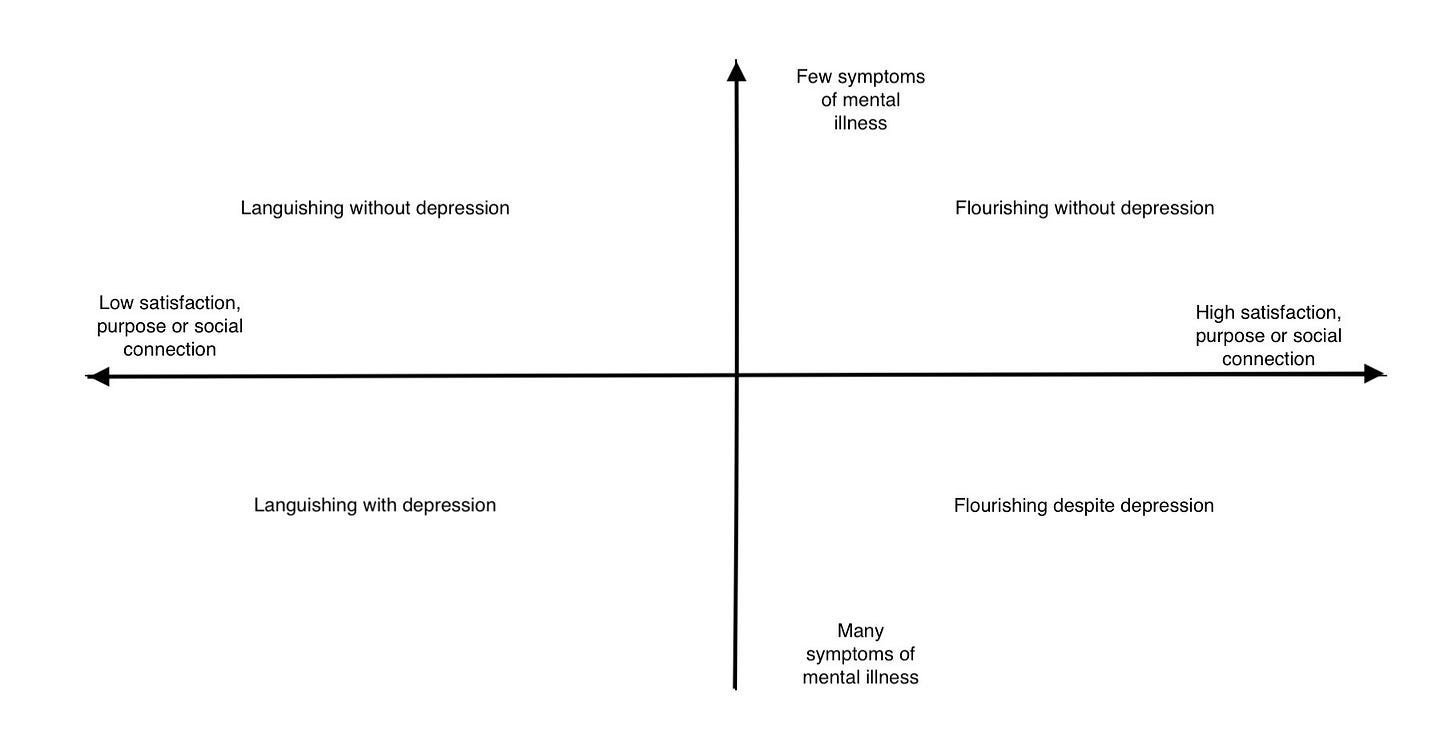How to overcome apathy at work
A new report suggests that the majority of people are "languishing" in their jobs. What can we do to regain our verve?
Hello, and welcome to the third edition of 60-Second Psychology.
We may have passed the (almost certainly mythical) “Blue Monday”, but feelings of listlessness and apathy can linger throughout the year.
Consider the following questions. On a scale of 0 (never) to 5 (every day), how often do you feel:
Happy
Interested in life
Satisfied with life
That you have something to contribute to society
That you belong to a community
That people are basically good
That your life has a sense of direction or meaning to it.
This is a taster of the “Mental Health Continuum” devised by sociologist Corey Keyes. On one side of this spectrum, you have “languishing” – people who score low on most of the statements; on the other, you have “flourishing”, people who score high on many of the items.
Keyes’ big idea is that a lack of positive well-being can be distinct from the negative symptoms – such as hopelessness, trouble with eating, or sleeping – that we use to define mental illnesses such as depression. “People can have no mental illness and poor mental health – in other words, they are languishing yet don’t have a mental health condition,” he told New Scientist in 2024. Conversely, he argues that someone with depression may still retain some of the elements of flourishing, such as a sense of meaning in life or the sense that people are good, even if they are suffering in many other ways.
Ideally, you want to sit somewhere in the top right quadrant of the graph below:
Given how much time and energy we expend there, it should be no surprise that the workplace is the source of many people’s discontent. Just last week, a survey of 2000 US employees found that 57 per cent of people feel that they are languishing at work. Multiple factors may contribute, including insufficient resources to meet the challenges of the job, a lack of autonomy, and little support for personal development. I wonder if the political and economic upheavals may also contribute. It can be hard to flourish when you’re unsure that your job will even exist in five years.
For me, languishing feels like being stuck on an endless treadmill: you’re going through the motions without moving anywhere. And I suspect that it may promote counterproductive behaviours that only dig us deeper into our rut. It could amplify perfectionist tendencies, for example – we wrongly believe that we can restore our sense of fulfilment by setting ourselves arbitrary standards to live up to, when what we really need is a new challenge that offers the opportunity for growth or creativity. At worst, we may allow our discontent to bleed into our relationships with our colleagues. We might begin micromanaging others’ tasks, for example, as a way of justifying our existence at the expense of their autonomy. None of these strategies are likely to produce the longer-lasting sense of meaning and purpose that we seek.
Once we have recognised our state of languishing, we can try to find more fruitful ways of restoring our verve. It may prompt a frank conversation with our managers about the support we need to flourish. We might also reflect on the reasons that we decided to embark on this career in the first place, and then look for small ways to reconnect with those values. Or we might make more of a conscious effort to engage with the professional community – by volunteering to act as a mentor to a junior colleague, say.
If none of these steps helps, we might consider whether we’ve been placing too much importance on our jobs as our main source of pride and purpose. “When we're completely entangled in our work, and our identity has become enmeshed with it, it can be very scary to stop and even contemplate doing something else,” Anna Katharina Schaffner, an executive coach and burnout expert told me in an interview for the BBC. “Because the more of our time and energy we dedicate to work, the emptier the other domains of our lives become.” The result is a kind of vicious cycle, where our increased efforts to find fulfilment in our careers only drives us to greater unhappiness. “It’s very important gradually to build up other sources of meaning and joy and pleasure in our lives, so that work is not all we have.”
There is no single solution that will work for every person – or even the same person at different stages of their life. Simply being able to identify the state of languishing is, however, an essential first step.
Book of the Week: Talk: The Science of Conversation and The Art of Being Ourselves by Alison Wood Brooks
If you are interested in learning more about the best ways to reignite your lust for life, I’d thoroughly recommend Corey Keyes’ Languishing, and Anna Katharina Schaffner’s Exhausted. This edition’s book pick, however, is Alison Wood Brooks’ Talk, which came out last Thursday. The title is a clever play on Brooks’ recipe for better chat: Topics, Asking, Levity and Kindness, or TALK for short. We might think that some people are born brilliant conversationalists, but we can all learn to improve.
I hope you all have a lovely weekend. I’ll be spending it in Wales on a mini reading-and-writing break.
As ever, if you enjoy this content, please consider sharing it with others, and click subscribe if you haven’t already.
See you next week!
David





